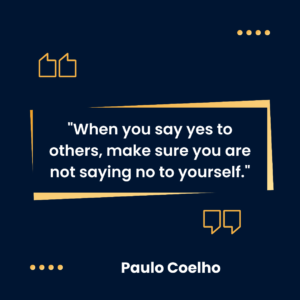Saying a simple “No” when it is required seems to be a major problem with many youngsters. To understand the seriousness of the problem, I sent out a simple questionnaire to students and working professionals seeking to understand whether the respondents can say “No” to people whenever required and if not, why. I have received 712 responses from the age group 18 to 30 years.
The Findings
The findings are awakening:
A whopping 79% said they find it very difficult to say “NO”. Some of the most common reasons for not being able to say “NO” are given below:
- I don’t want them to feel bad.
- I think it will harm my reputation
- I feel like I’m disappointing people if I say No.
- I think that people will think I’m rude.
- Somehow, I feel guilty that I may hurt someone.
- I don’t want to make them feel that I’m incapable of doing what they asked for.
- I have this constant anxiety about not letting people down.
- Maybe people at work will think I’m not good enough.
- My boss may not like me.
- I feel I won’t be accepted in the group.
- I feel people will not like me.
- I will miss out on something.
- I fear losing my job.
- I fear my friends will leave me out.
Analysis
Making sense of these responses sheds great light on the dynamics of human behaviour. Let us examine a few:
- The need for validation: Saying “yes” can be the easiest way to gain approval or validation and maintain relationships.
- Fear of conflict: Saying “yes” solves the immediate problem of confrontation.
- Fear of rejection: Saying “no” can be linked with rejection or being recognized as unhelpful. Saying “yes” gives a feeling of being included.
- Fear of Disappointing others: Some people fear disappointing others and hence say “yes” attach more importance to others’ feelings over their own
- Feeling guilty: Feelings of guilt, whether imposed by oneself or others, can lead individuals to say “yes” to avoid feeling bad about disappointing someone or failing to meet expectations.
- Cultural or social expectations: Societal and cultural expectations can label a person as rude, impolite, and unsocial if they say “no”.
- Lack of assertiveness skills: Many people mistake being assertive as being aggressive. Hence, they avoid saying “no” as they do not want to be seen as aggressive.
- Fear of missing out: The fear of missing out (FOMO) is emerging as a serious problem as people feel saying “no” could result in being left out and they would miss out on some perceived benefits.
- Unable to prioritize: Many people struggle to prioritize their own needs over others and as a result agree to requests from others and then find it challenging to meet both.
- Lack of Time management skills: People are not able to estimate the time required for any job and hence overcommit.
Tips to say "No"
I have met people who say, I know I should say “No” to some circumstances, but I don’t know how to say it!
The solution is to learn to say “No” politely. This means that it is important to learn to be assertive. While it may seem hard in the beginning, it can be learned by practicing.
Here are a few tips to say “No” politely in different situations:
- Listen attentively to others, this shows you respect their input. If you differ from others say politely, “I appreciate your perspective. However, my views are…(say briefly)”
- Be clear and specific: Ambiguity in communicating your views will be misread as acceptance. Hence, be clear. Instead of using words like maybe, I guess, say “I prefer it this way”.
- Body language: Positive body language is a great differentiator in assertive behavior. Slouching, and avoiding eye contact are not considered appropriate in assertive communication. You must maintain eye contact, sit, or stand straight, and use open posture and gestures while conveying your message politely but firmly.
- Define boundaries: Clearly define personal and professional boundaries. If you are invited to stay back for a drink when you had promised to take your family out, politely say “Thank you for the offer, I’m sorry I won’t be able to make it as I am going out with my family” or “No, sorry. I need to prioritize my family right now.”
- Friends call you for a party and you are not feeling well or have important tasks lined up. It is all right to say, “Thank you for inviting me, I’m so sorry, I won’t be able to make it as I have some prior commitments”.
- When the boss wants you to take on additional work of a colleague who left suddenly but makes no effort to find a replacement: It is all right to take up critical parts of the job with a clear caveat that it will affect your work and hence priorities need to be finalized along with a timeframe to find a replacement. You could say, “I appreciate your considering me for taking on additional work, but I won’t be able to do it for more than a week as my work will suffer”.
- When your classmate in college wants you to do his/her assignment, say “You try it on your own first, and then I can help you if I have some time to spare” Or “Unfortunately, I have too much to do today. I can help you another time, but not today.” Or “Sorry, I have already committed to something else. I hope you understand.”
- If someone keeps wanting to borrow money from you: You could politely say “I no longer can help you. Sorry about that.”
- When you are invited to a weekend bash, and you have assignments due for submission. Say, “That sounds fun, but I have a lot going on at the moment.” Or “Thank you for the invitation but my weekend schedule is full.”
- When there is no work, but the boss is hanging around in the office and expects you to stay back (making your personal life suffer): Politely but firmly say, “I’m done for the day, have to catch up on the personal front”.
Learn to be Assertive
It is essential to develop assertiveness, understand your priorities, and choose the right words while communicating. Remember, words can hurt but also heal, encourage or discourage, or sound polite or rude.
Saying “No” politely can work wonders. Being polite includes the right tone of voice, your body language, and using the right words. This alone will empower you to be authentic while saying a “No”.
For some further inputs, I suggest reading one of the finest books on the topic “Don’t Say Yes When You Want to Say No: Making Life Right When It Feels All Wrong” by Herbert Fensterheim Ph.D., and Jean Baer.

Remember, when you want to say “NO” say it! You may lose a few friends or not be liked by some, you may even give up a job, but you will be happy that you could stand up to something you truly didn’t want to do!
The ability to say “No” assertively adds to your happiness quotient. It also gives you peace of mind in the long run as you are no longer burdened with any guilt. Opt for a better life!




